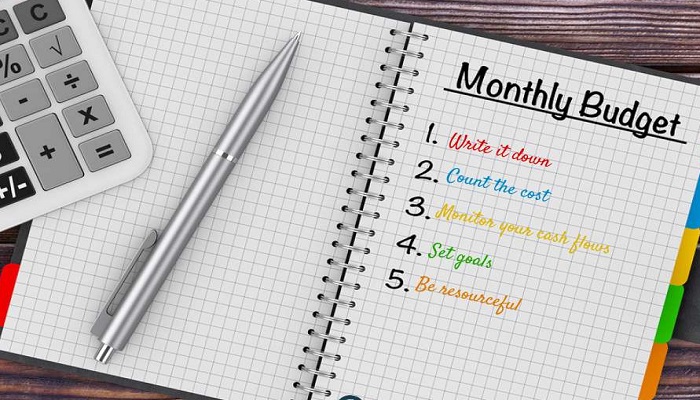The best way to be financially stable is to have a good plan on how to deal with your bills based on a certain percentage of your income.
And then save the rest to prepare for bigger goals like children’s school fees, buying a car, building a house, retirement, and so on.
If you don’t make a budget for all your goals, it means you’ll spend your income as you make it and have nothing in stock for the future.
Once you exhaust your income, you’ll be “broke” and still have a number of important bills unattended to resulting from oversight.
Consequently, when you need a better thing to do, you’ll start looking for someone to give you a loan, which can’t solve your financial problem but worsens it.
Regardless of the amount you earn, big or small, budgeting will let you know how much you earn, and how much you want to spend, then start allocating funds as appropriate.
If you can manage your finances, then you can begin to build financial success through saving and investing your money.
Budgeting doesn’t mean you’ll keep your money in the bank and pretend you’re broke when you need to pay your children’s school fees, put food on the table, change your wardrobe, or go for holidays and have fun.
Budgeting is making your plan preparing for all your bills ahead of time and reducing your expenses to a minimum degree.
How can you go about this, let’s say you have a $300 bill to clear in six months’ time and your monthly income is $100.
If you can save $50 in your income every month, you’ll conveniently pay the bill at its due time.
Assuming your feeding cost and other regular expenses is part of the bill, while you’re settling the $300 bill, you’ll still have another $300 in your savings.
Allocating 50% of your income each for your monthly bill and savings can’t hurt you in any way. All you have to do is to be prudent at spending your money and you’ll be financially stable.
Understanding Your Financial Situation
Before you can improve your financial habits, it’s important to understand where you stand.
Knowing exactly how much money you have coming in and going out will give you a clear picture of your finances.
Start by assessing your income and listing all sources of it, including wages, side gigs, or passive income streams.
Then, track your expenses—don’t forget the small ones! Coffee runs, streaming subscriptions, and that late-night snack might not seem like much, but they can add up quickly.
Identifying unnecessary expenses is the first step toward cutting back and saving more.
Setting Realistic Budget Goals
Setting goals is vital when it comes to budgeting. Without a clear purpose, it’s easy to get distracted.
Financial goals should be specific, measurable, achievable, relevant, and time-bound (SMART).
Ask yourself: What are my priorities? Maybe you need to pay off debt, start an emergency fund, or save for a vacation.
Whether you’re focused on short-term goals like saving for a new laptop or long-term ones like retirement, having a roadmap will help you stay on track.
The 50/30/20 Rule Approach
One of the easiest and most popular methods for budgeting is the 50/30/20 rule.
This simple rule breaks your income into three categories: 50% for needs (housing, utilities, groceries), 30% for wants (entertainment, dining out, shopping), and 20% for savings and debt repayment.
By following this guideline, you ensure that your money is being distributed wisely.
You might need to adjust these percentages depending on your situation, but the idea is to prioritize essentials and save consistently.
Creating Your Budget: Step-by-Step Process
Now that you’ve got your goals and a budgeting method in mind, it’s time to create your budget.
Start by categorizing your expenses. Common categories include housing, transportation, groceries, entertainment, and debt repayment.
Once you’ve listed everything, set a limit for each category based on your income and priorities.
Don’t forget to track your spending throughout the month. There are plenty of apps available to help you do this, or you can use a simple spreadsheet.
Keeping track will help you stay on course and prevent overspending.
Cutting Down on Unnecessary Expenses
One of the quickest ways to improve your finances is by cutting back on unnecessary expenses.
Start by evaluating your subscriptions and memberships—do you really need that gym membership or premium streaming service?
Canceling a few things can free up cash for savings or paying down debt.
Meal planning is another great way to save money. Cooking at home is often cheaper than dining out, and it allows you to make healthier choices.
And when it comes to impulse purchases, give yourself a cooling-off period before buying anything non-essential.
Trust me, that new gadget won’t seem as appealing after a few days.
Making Your Lifestyle More Affordable
Living below your means is a powerful way to improve your financial situation. Consider downsizing your living arrangements if possible.
Could you move to a more affordable neighborhood or share rent with a roommate? Reducing housing and transportation costs can make a big difference.
There are also plenty of thrifty alternatives for everyday purchases. Look for sales, use coupons, and consider buying second-hand items.
Embrace minimalism and focus on buying only what you truly need. By making small changes, you can stretch your dollar further.
Building an Emergency Fund
One of the best things you can do for your finances is to build an emergency fund.
Life is unpredictable, and having a safety net can prevent you from falling into debt when unexpected expenses arise.
Start by saving a small amount each month, even if it’s just $50. The key is consistency. Ideally, aim to save three to six months’ worth of living expenses.
Keep your emergency fund in a separate account so you aren’t tempted to dip into it for non-emergencies.
Saving for Big Purchases and Future Goals
Saving for big purchases, like a car or a vacation, requires planning. Set up sinking funds—separate savings accounts designated for specific goals.
This will help you save for large expenses without dipping into your emergency fund.
Don’t forget about the future—retirement can seem far away, but the earlier you start saving, the better.
Consider automating your savings through direct deposits into your retirement account. It’s a simple way to make saving effortless and ensure you’re prepared for the future.
Tips to Stick to Your Budget
Sticking to a budget can be challenging, but there are ways to stay motivated. Track your progress and celebrate small victories.
Whether it’s paying off a credit card or reaching a savings goal, reward yourself for your hard work.
Get support from friends or family to stay accountable. And don’t forget to regularly reassess your budget.
Life changes, and so do your financial needs. By making tweaks as necessary, you’ll keep your budget aligned with your goals.
Financial Freedom Through Consistent Budgeting
Achieving financial stability doesn’t happen overnight, but with consistent budgeting, it’s definitely possible.
By understanding your finances, setting goals, cutting unnecessary expenses, and staying disciplined, you can stop being broke and start building wealth.


